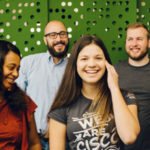As a Collaboration Engineer a major part of what I do at Cisco is to empower people with the right tools to connect with each other, conduct business, and have an open communication channel. It gives me a sense of contentment that we at Cisco get to help our customers in such ways, and that communication is such a priority here.

We all go through difficult times, it’s true. For me, it was at 10 o’clock in the morning after I had just reached the office. I was stressed and feeling down as my husband works and lives in Singapore, and I am currently in Sydney, Australia. He had left to go back to Singapore just the night before, and as I logged in to my computer – the weight of pending work hit me.
I was suddenly overwhelmed and lost in trying to decide where I should start. That’s when I heard a voice ask, “Neha, are you okay?” It was my teammate Aashish.
Out of habit I told him that I was good, but Aashish kindly persisted. “Are you sure you are okay? You look a little overstretched. Come, let’s quickly get a cup of coffee.”
Never one to pass up a cup of coffee with a great co-worker, we headed downstairs and ordered. While we were waiting, I shared with Aashish why I was struggling this morning. He listened patiently and offered to help me with some of my workload. I assured him I would be okay, but just vocalizing my struggles made me feel lighter.
When I got back to my desk, I was re-energized and ready to tackle my tasks. It’s amazing what one question, a cup of coffee, and a 10-minute conversation can do! Being able to share my concerns and stresses and being heard without judgement gave me a fresh outlook to my day. That one simple gesture from Aashish instantly made me feel lighter.
One simple question, just three words can make all the difference – “R U Okay?”
In Australia we celebrate “R U OK? Day” every year on the second Thursday of September. This is a national day of action dedicated to reminding everyone that any day is the day to ask, “Are you okay?” and to help support those who may be struggling or overwhelmed. Our Global Technical Assistance Center (TAC) in Sydney took the opportunity during our All Hands to raise awareness about R U OK? Day.
I was extremely inspired by this initiative.
 Our goal was to encourage our fellow co-workers to start these conversations every day of the year. And while we marked the occasion with cupcakes, T-shirts, and caps – we were serious in educating our teams on how to reach out to someone who may be stressed, overwhelmed, or in need of someone, to talk to.
Our goal was to encourage our fellow co-workers to start these conversations every day of the year. And while we marked the occasion with cupcakes, T-shirts, and caps – we were serious in educating our teams on how to reach out to someone who may be stressed, overwhelmed, or in need of someone, to talk to.
When I joined Cisco, I used to tell everyone that I possibly could that I was working for the BEST team I have ever seen. That is still true today.
It impressed me most though when I attended a recent training where everyone had to introduce themselves and say one thing they loved about their day-to-day jobs. Almost 80% of the participants said that they loved the fact that everyone at Cisco helps each other out. We look out for one another and have each other’s backs.
I realized in this moment how much our culture and ethics here at Cisco have been strongly integrated into the very fabric of who we are. It isn’t just my team that is this amazing and supportive of each other – but this is the Cisco norm!
We as employees see these values rippling down to us from the top as well. Almost every day I hear our managers ask, “Are you okay?” Our leaders want to ensure their teams are well taken care of, heard, and understood. And we employees feel safe to open up and be as honest as possible, in particular when we might not be okay.
This is such a relief to many of us.
I recently moved to Sydney to work for my dream company (Cisco), and in my dream job (Collaboration Engineer). All I came here with was with a suitcase full of dreams, shoes, and the loneliness of leaving behind a very happy and well-settled life in Singapore. When I look back at this year, I wonder if my new journey would have been this easy and beautiful if I did not have my Cisco family supporting me.

My worries on that sad, soppy morning of being in a long-distance relationship with my husband are, I am sure, nothing compared to what others might be struggling with. We never know who is fighting a harder battle, from mental health concerns to a sick child at home or un-well parents to those who live alone thousands of kilometres away from their families.
The best we can do is to support one another.
Of course, no one can bear the brunt of your problems but you. However, coping with those problems gets easier if you have people looking out for you and checking in to see if you are okay every step of the way.
What I learned from “R U OK?” Day is that when we see someone stressed, lost, or we get a sense they may be struggling – we can take the following steps to help:
- Ask “R U OK?”
- Listen without judgment.
- Encourage action.
- Check in and follow-up.
Our dedication to each other at Cisco makes me proud that we are not only helping to run a successful business, but that we get to see and be part of the actual gears in motion – face to face. We are encouraged to take care of our customers, our colleagues, our families, and ourselves all through Cisco’s leadership and support.
This is unlike any other company I have known, and I am proud to be a Cisco Collaboration Engineer.
Want to join a company that cares? We’re hiring. Apply now.


R U Okay? Simple and such powerful words! Brilliant initiative. Thanks for sharing this story.